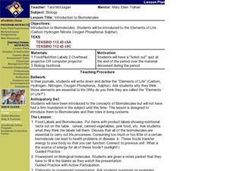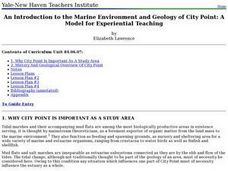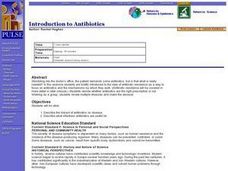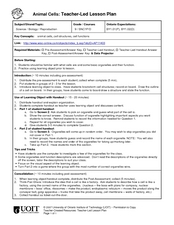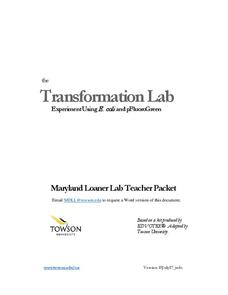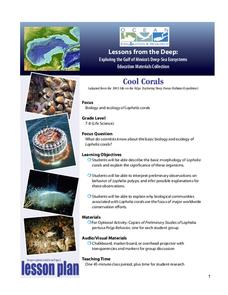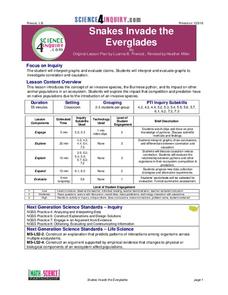Nuffield Foundation
Investigating the Effects of Biochar on Soil Fertility
Breathe some new life into charcoal. Scholars use biochar to improve soil fertility. They test the effectiveness of this addition by conducting an experiment with soil having 0%, 2%, and 4% biochar.
Curated OER
Introduction to Biomolecules
Students are introduced to biomolecules and their roles in livin systems. They are introduced to the "Elements of Life." Students write down and define the "Elements of Life." They are asked why they think those elements are essential...
Curated OER
Introduction to Mendelian Genetics using Fiction
Students investigate Mendelian Genetics by studying the history of Mendel and what it was like to be a 19th century scientist. They read a pieces of fiction during this investigation.
Curated OER
Introduction To Natural Selection
Seventh graders investigate the concept of natural selection and it relation to the theory of evolution. They create a definition for classification based upon looking at other subjects that are similar. The variation of species is...
Curated OER
Introduction to Measuring the Forest
Students investigate how much wood is in a forest. In this forestry lesson plan, students calculate how much usable wood comes from the forest. They will read, Sizing Things Up from Trees + Me = Forestry, measure firewood piles, and...
Curated OER
An Introduction to the Marine Environment and Geology of City Point: A Model for Experiential Teaching
Students begin the lesson by researching the history of City Point, Connecticut. Using a map, they color areas they were asked to find and discuss why the areas are important to the community. As a class, they are shown recent slides...
Curated OER
Introduction to Measurement
Student observes and measures the variability in the length of the forearm and the length of the foot and to test a common belief that the length of the foot is equal to the length of the forearm.
Curated OER
Introduction to Antibiotics
Students describe the impact of antibiotics on disease. They describe what infections antibiotics are useful for. Students are introduced to the idea of antibiotic resistance as a way to focus on antibiotics and the mechanisms by which...
Out of Africa Wildlife Park
A Thematic Learning Guide to Lions
Written as an accompaniment to a field trip to the Out of Africa Wildlife Park in Arizona, this is an interdisciplinary, themed lesson on lions. Even if you cannot take your upper-elementary kids to this attraction, there are a few...
Curated OER
The Great Cafeteria Caper
Learners extract DNA from their own hair roots. They run an electrophoresis gel to examine patterns of their DNA along with standard DNA. The experiment is based on a crime scene scenario.
Curated OER
Animal Cells
Young scholars define the function of the different parts of a cell. In this biology activity, students discuss cell structures and how its organelles perform basic functions. They differentiate between human and animal cells.
Curated OER
Medical Explorer: The Big Idea
Read informational text which relays how medical care differs around the globe and throughout history. There are three separate lessons, each focused on a particular case study, regional medical availability, and cultural norms. Learners...
Towson University
Transformation Lab
Transform your class' understanding of genes and antibiotic resistance with the Transformation Lab. Junior geneticists create and observe their own resistant strains of E. coli through research, discussion, and experimentation. The...
NOAA
Deep-Sea Ecosystems – Cool Corals
Young oceanographers research deep sea corals that thrive on chemosynthesis. The lesson focuses on the biology of the animal, preferred habitat, associations, and interactions.
Towson University
Chestnut Tree Lab
What will your class learn in a curious tale of a fungus, a virus, and a chestnut tree? Biology scholars discover the world of viral biocontrols through a DNA restriction lab. Groups research the decline of the American chestnut tree at...
Kenan Fellows
Let's Move
Find a statistical reason for a fresh start. Using a hypothetical scenario, individuals research statistical data of three different cities. Their goal? Find the best statistical reason for a business to move to a new location. Their...
University of California
Energy and Biomass Pyramids
Young scientists play tag as they act out the food pyramid in the ocean ecosystem. Energy circles pass from the smaller prey to the predators and at the end of the activity, a data chart and analysis questions allow pupils to apply their...
NOAA
Vertebrates II
Mammals of the ocean unite! Or not. The 20th installment of a 23-part NOAA Enrichment in Marine sciences and Oceanography (NEMO) program investigates how warm-blooded marine mammals survive in water. In the class activity, learners use...
Creative Learning Exchange
The Infection Game: The Shape of Change
Encourage the spread of knowledge in your class with this cross-curricular epidemic simulation. Pulling together science, social studies, and math, this lesson engages students in modeling the spread of infectious diseases, collecting...
LABScI
Population Dynamics: The Predator-Prey Lab
Wolves eat better when the bunny population increases, but how long does that last? A series of 12 biology lessons uses the sixth installment to explore the predator-prey relationship between bunny and wolf populations. Young scientists...
Towson University
Case of the Crown Jewels
Can your biology class crack the Case of the Crown Jewels? Junior forensics experts try their hands at DNA restriction analysis in an exciting lab activity. The lesson introduces the concept of restriction analysis, teaches pipetting and...
Science 4 Inquiry
Snakes in the Everglades
The Burmese python is on the loose ... and he's hungry! Illustrate the differences between causative and correlative relationships through an inquiry lesson. Pupils examine several sources of information to determine if there is a...
Teach Engineering
Designing a Sustainable Guest Village in the Saguaro National Park
Brainstorm ideas to design a sustainable guest village in the Sonoran Desert. The first installment of a nine-part unit teaches young environmental scientists about the basics of the Saguaro National Park and about sustainable design....
Curated OER
Introduction to Scientific Theory
Ninth graders explain how scientists set up investigations. In this scientific process instructional activity, 9th graders review the principles of the scientific method and use these skills to answer an open-ended question about how to...



